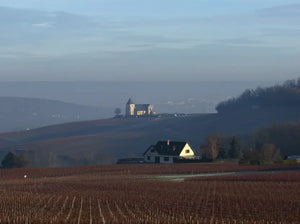Blog » Biodynamic
-
André Ostertag: Alsatian Sensation
Domaine Ostertag has long gone against the grain of Alsatian expectations, crafting dry, disciplined wines that still summon the sunshine that marks the region. His Fronholz and Grand Cru Muenchberg Rieslings especially imbue the transparency and purity of a mountain lake. These wines are a moment of clarity for Alsace!
Alsace is in the cool northeast pocket of France, and its protection from the Vosges Mountains means it receives the least amount of rainfall of any region. This abundant sunshine has long given Alsatian wines a rounded and golden orchard fruit quality, often with a dollop of residual sugar. However, several elements separate Ostertag from the norm. André studied viticulture in Burgundy and returned home in 1998 to employ organic and biodynamic principles in the vineyard. He also decided to ferment his Rieslings completely dry and age them in stainless steel.
Today, Alsace is famous for having the highest percentage of organic and biodynamic producers in France. While the quality at harvest couldn't be higher, I still find few producers that execute with the same sense of harmony that Ostertag is adored for. -
Bona Fide Naturalist: Werlitsch vom Opok
Wineries like Werlitsch in Austria's Styria region perpetuate those dreamy biodynamic farm vibes we've seen springing up in Eastern Europe. Sure, the scenes are breathtaking and make for a good selling point, but what winemaker Ewald Tscheppe produces from his opok-rich soils restores our faith in the far reaches of natural wine.
Our team once blind-tasted the Ex Vero I together. It had a matchstick quality on the nose, followed by white florals, fresh citrus, coconut milk-like texture, and electric acidity on the palate. Still, the wine's focal point was its lively energy and slightly waxy texture. I guessed it was from the Jura, thinking it had a Burgundy gone rogue feeling, but it turned out to be a blend of Sauvignon Blanc and Morillon (aka Chardonnay). Ex Vero is a three-part series showcasing the varied levels of altitude and soil composition on Werlitsch's steep hillside. These vines grow on limestone and clay soil rich in minerals and marine fossils, which locals refer to as opok. Frankly, the wines are unlike anything you'll taste from Austria or elsewhere.
Ewald and his friends discovered biodynamics while studying wine in the early 1980s. As a true devotee of the naturalist movement, he believes that nature always does it better—for him, that means gravity-flow winemaking, natural yeast, no temperature control, and no sulfur. In 2004, Ewald began to apply biodynamics to his family's estate, which also inhabits fruit trees, wild herbs, vegetables, and forests. -
Pinot Meunier Whisperer: Laherte Freres
Tucked between the Côte de Blancs and the Vallée de la Marne, Aurélian Laherte has almost single-handedly put the tiny Côteaux Sud d’Epernay on the map with his truly singular and brilliant work focusing on Pinot Meunier.
This 1889-founded domaine has followed an organic and biodynamic path since Aurelian took the reins in 2005. He opts for old Burgundy barrels, partially or fully blocks malolactic fermentation, and keeps dosage between very low to zero, giving wines with body and texture but a precise and saline-driven mineral backbone—a combo that really appeals to me.
Laherte's Ultradition Extra Brut has been a house champagne for us for many years. Now, the secret is out, and we’re limited to as few as 12 bottles a year. At $53, the value cannot be overstated. There's also the micro-production cuvées from single parcels that are off the charts.
.svg?v=162776257677185172071724397232)





